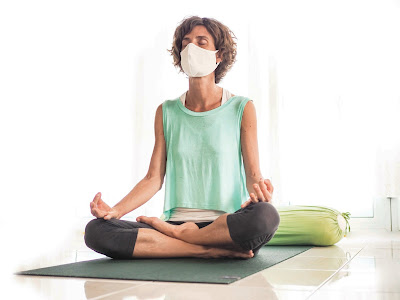The coronavirus pandemic has changed what a normal day looks like for many across the country. And the pandemic has also increased the stress of many Americans.
Prioritizing mental health and well-being in the face of a pandemic, which has caused many to lose their jobs or work from home, is something that every single person should be doing, but it often falls by the wayside.
Maintaining your mental health during these uncertain times can be challenging, especially if you’re not sure how to get started. That’s where meditation can help. There are many different types of meditation to try, and you can see its positive effects after a few minutes.
What is meditation?
Meditation is an activity that can calm your mind and keep you focused on the present. In a meditative state, you can clear your mind of cluttered thoughts and memories. Studies even show meditation is effective in controlling anxiety, enhancing the immune system and reducing conditions such as high blood pressure, substance abuse and chronic pain. There are numerous kinds of meditative techniques, but concentrative, mindful and transcendental are the most common.
- During concentrative meditation you focus your attention on a single sound, object or breathing pattern to bring about a calm, tranquil mind.
- During mindful meditation, you keep your mind aware, but you do not react to sensations,
feelings or images going on around you.
- During transcendental meditation, you put your body at full rest but keep your mind fully alert, bringing about a deep state of relaxation.
How to Practice Meditation
There are countless ways that you can practice meditation. And, during the coronavirus pandemic, many meditation apps are offering discounted or free memberships to help you lower your stress during these uncertain times.
Mastering meditation takes practice, but getting started is easy and takes just minutes of your time. Try these two quick mindful meditation techniques next time you’re feeling stressed.
- One-minute relaxation breathing—Close your eyes and take a deep breath in for a count of four, and then exhale for a count of eight. Repeat five times.
- Five-minute body scan meditation—Sit or lay down in a comfortable position and take a few moments to find a calm, steady breath. Bring your awareness to sensations in your body, where you will spend several slow breaths on
Health and wellness tips for your work, home and life—brought to you by the insurance professionals at Insurance by Design
Get Started Today
Meditation can help you lower your stress, which is essential for maintaining your mental health during the coronavirus pandemic. Use the tips discussed above to get started today.
each focal point beginning with the left toes and all the way through the left hip. Repeat on the right side. From there, follow the same process through your torso, arms and up through your head.
Tips for Successful Meditation
If you’re new to meditation, it can be tricky to get started. Keep the following tips in mind to have a successful meditation session:
- Schedule a meditation session like an appointment—Blocking off time will help you plan for meditation. And it will communicate to others in your house that, during that specified time, you need to be alone so that you can focus on meditating.
- Find a designated meditation spot—Find a quiet place in your home where you can meditate. It should be separate from where your workspace may be. As you continue with meditation during the pandemic, your brain will begin to associate this special area with meditation, and you’ll subconsciously begin to relax when you’re in this space.
- Use noise-canceling headphones—Chances are, you might not be able to have total silence in your home when you go to meditate. This is especially true if you have children or pets at home, or live with roommates. Try wearing noise-canceling headphones whenever you meditate so that you can focus on your meditation.
- Don’t get discouraged—Meditation takes practice, and it can take a few days or even weeks to successfully incorporate it into your life. If you’re not able to sit through a full session of meditation, don’t get discouraged. Keep trying and, soon enough, you’ll be able to regularly meditate.







What's your opinion?